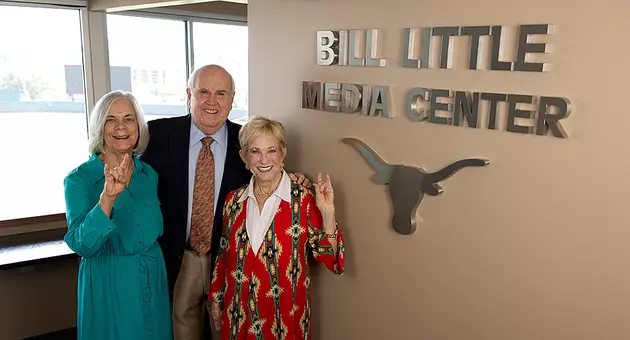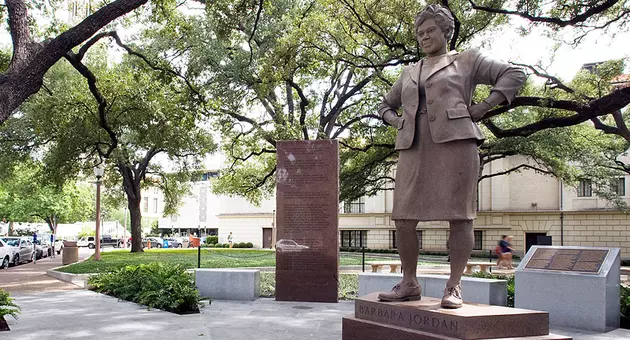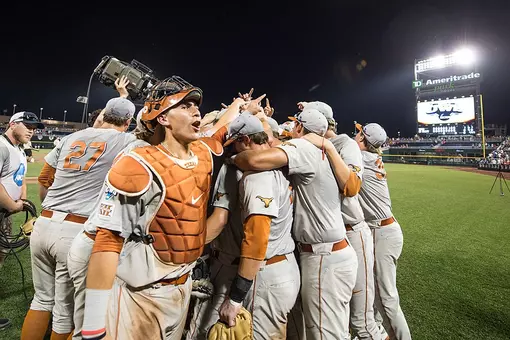The University of Texas at Austin Athletics
Bill Little commentary: All the way with LBJ
04.09.2014 | Bill Little Commentary
A look back at the friendship between President Lyndon Johnson and Darrell K Royal
By Bill Little, Texas Media Relations
The only elevator in the old press box at the Cotton Bowl Stadium was a vintage one removed from the push button, digital world of today, and the white-haired fellow who personally drove it for the navigation from the field level to the writers level had made that trip many, many times.
It was standard procedure, with five minutes remaining, the elevator would be held for the press to vacate their posts from high atop the west side of the stadium and descend to post-game interviews after yet another "Cotton Bowl Classic"—played annually on New Year's Day, year after year.
The veteran media relations director for the Southwest Conference was a fellow named Bill Morgan, who ran the media portion of the game with a rigid, iron hand. Nothing—absolutely nothing—was more important to Morgan than the needs of the media. Unless, of course, it was his need to be in charge.
Such was the case on January 1, 1970, when Texas was playing Notre Dame. The game itself was historic. The Irish hadn't played in a post season bowl game since 1925. Texas had beaten Arkansas in the "Game of the Century" in early December and was the acknowledged National Champion of college football. Everybody who was anybody was at the game, and the media coverage was unprecedented.
So when Bill Morgan announced over the press box public address that the elevator was being held for the departure of the press with five minutes remaining on the game clock, he was in complete command. Until a gentleman in a dark suit wearing sunglasses and an ear piece approached him.
"We will be taking the elevator for President Johnson to go to the field," he said, adding, "with five minutes on the clock."
As Morgan started to protest, I took one look at the bulge underneath the vest pocket of the dark suit, and I pulled the SWC representative aside.
"Bill," I said. "This guy is with the Secret Service. Don't argue with a guy with sun glasses, an ear piece and a gun."
And with that, Lyndon Johnson, by then the former President of the United States of America, headed to the Longhorn dressing room to congratulate his friend, Darrell Royal.
As Austin is immersed in memories of Lyndon Johnson, it is appropriate that we in Texas Longhorn Athletics take just a minute to remember the remarkable relationship between LBJ and DKR.
On the surface, it would seem an odd union. President Johnson was a politician whose roots dated all the way back to the New Deal days of Franklin Roosevelt, and Royal was a football coach who wouldn't know a Democrat from a Republican. In fact, when he was hired as Texas' head coach in December of 1956, his boss, Dana X. Bible, had given him one piece of advice toward negotiating the rough waters of co-existing with the power brokers in the Texas statehouse.
"Darrell," he had said with a strong drawl, "stay away from the Capitol."
But in the early 1960s, as Royal became a larger-than-life figure as the dashing young football coach at the nation's highest profile grid power, it was only natural that powerful people would get to know powerful people. And that became a natural fit for Darrell and Edith Royal and Lyndon and Lady Bird Johnson.
It was Royal who had been hand-picked to greet John Kennedy when he arrived in Austin with Lyndon Johnson for a dinner on Friday, November 22, 1963. He was tying his tie to head to Bergstrom Air Force when word came that President Kennedy had been shot in Dallas.
The dark days that followed actually changed the lives of both men. Royal's football team went on to defeat Texas A&M six days later to win his first National Championship, and Johnson assumed the daunting task of trying to hold together a nation in mourning.
When Johnson was elected president in the fall of 1964, Darrell and Edith were invited to join the Johnsons and the nation for the inauguration in January of 1965. The ensuing years found Johnson carving history, and that is why this week's activities will remember him as the master at bringing two divergent sides together, a reflection of his incredible ability as a negotiator and mediator.
While LBJ was burdened with managing an unpopular war in Vietnam, Royal hurt for his friend—and as leader of young men, he understood all too well the heavy weight the President carried.
The decade of the 1960s would end with ABC-TV naming Royal the Coach of the Decade, but in the middle of the ten-year span, while Lyndon was still in the White House, Royal's teams struggled. It was then that Johnson dropped Royal a note that said, "You are the finest example of an inspiring young leader that I know."
The unique relationship continued to blossom, even though Royal avoided politics and Lyndon—by his own admission—didn't particularly care for football. The bond, instead, was their friendship.
"I am not a football fan," Johnson had said, "but I am a fan of people, and I am a Darrell Royal fan because he is the rarest of people."
During his years in the White House, Johnson never attended a Longhorn football game, even though he and Lady Bird were known to call Darrell and Edith from time to time after a significant UT victory.
But when he returned to his beloved Texas Hill Country , he connected with Royal as a follower and supporter.
In that space, it seemed that Royal and Johnson had linked a friendship that easily covered the hour or so drive from the ranch near Fredericksburg and included some family vacations together. But on January 22, 1973, the heart disease which Johnson had battled most of his life would claim him as a victim.
When plans for the state funeral included various dignitaries and friends sitting in the great hall of the LBJ Library as mourners passed Johnson's casket, Darrell Royal was one of the sentinels.
This week, we remember LBJ, and those portions of legislation which he helped forge as America began its quest for "The Great Society."
And it is interesting to remember two diverse leaders who became fast friends, and who, each in their own way, made a significant difference in the lives of people, a state, a nation—and most of all, of each other.





